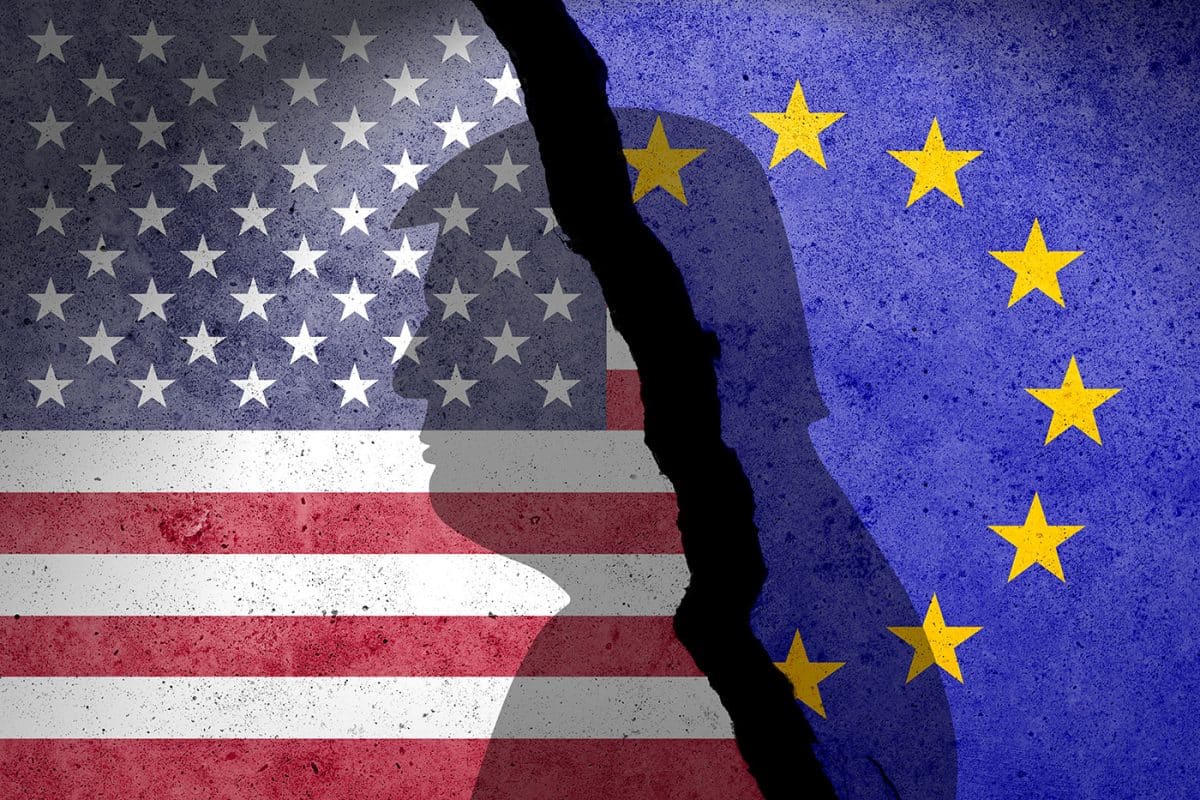American and French views on the Trump administration’s tariff hike
The tariff war launched by Donald Trump on April 2 has reignited transatlantic trade tensions to a level not seen since the “banana war” of 1993. Faced with the risk of escalation on both sides of the Atlantic, how do American and French public opinion view this aggressive trade policy and its consequences? As a close observer of Franco-American relations, the news website NYC.eu commissioned Ifop to carry out a survey which, for the first time, offers a dual-country perspective of the subject between the two countries. Conducted with a representative sample of 1,200 Americans and 1,000 French citizens, the study shows that Americans and French people are perfectly aware of the economic shock created by Trump’s tariff hikes, even if they don’t condemn the decision as strongly.
TO READ THE RESULTS OF THE STUDY, CLICK ON THE LINK BELOW: https://nyc.eu/press/customs-tariffs/#report
TEN KEY FIGURES
I – ON BOTH SIDES OF THE ATLANTIC, CITIZENS ARE APPREHENSIVE ABOUT THE EFFECTS OF HIGHER TARIFFS ON THEIR RESPECTIVE ECONOMIES, WITH AMERICANS ESPECIALLY WORRIED ABOUT RETALIATORY MEASURES FROM OTHER COUNTRIES…
1 – More than half of Americans (54%) believe that tariffs imposed by the Trump administration will have a negative effect on the US economy, up 2 points since March 2025. This level of concern is even higher among the French, 71% of whom believe these measures will harm the French economy.
2 – A strong majority of Americans (71%) say they are worried that the countries affected by the tax hikes will impose similar tariffs on American products in return. This concern cuts across the political divide, peaking among Democratic supporters (88%) and Kamala Harris voters (87%) in the last presidential election.
3 – Apprehension about possible boycotts of American products is also significant: 64% of Americans fear that the tax hikes will spark boycotts abroad, particularly among Democrats (79%) and the most educated sectors of the population (73%).
II – HIGHER TARIFFS AROUSE MASSIVE DISAPPROVAL IN FRANCE, BUT DIVIDE AMERICAN OPINION…
4 – Skepticism about these measures is also evident in their disapproval of Donald Trump’s decision “to increase tariffs on products from abroad, by a minimum of 10% on goods imported into the United States”. While the French overwhelmingly reject it (at 72%), American opinion is more divided: 49% of Americans disapprove, against 45% who approve.
5 – In the United States, opposition to this pricing policy follows a clear partisan divide: 76% of Democrats disapprove of these measures, compared with just 17% of Republicans, reflecting the extreme political polarization of American society. It is also strong among American women (54%, versus 43% among men), young people aged 18-24 (51%), and the most modest households (54%; earning under $25,000 a year), illustrating concerns about purchasing power.
7 – Suspended for 90 days since April 9, protectionist measures specifically affecting certain countries are also being contested, but not overwhelmingly: half of Americans, for example, disapprove of the 20% tariff hike on European products (50%, versus 37% who approve). But they are more tolerant of the 145% tariff increase on Chinese products (49%, versus 40% who approve).
III – THE AMERICAN PARADOX: GROWING SUPPORT FOR FREE TRADE BUT DIVIDED OPINION ON DONALD TRUMP’S PROTECTIONIST POLICIES…
The evolution of public opinion on both sides of the Atlantic since the last American-European trade crisis (1993) reveals a profound change in the way international trade is viewed:
8 – While only 44% of Americans favored free trade thirty years ago, 69% are now in favor (+25 points). Conversely, French support for free trade has fallen from 61% in 1993 to 47% today (-14 points), in favor of protectionism, which now enjoys 41% support (versus 34% in 1993).
9 – This support for free trade principles now transcends partisan divides in the USA: 77% of Democrats and 66% of Republicans are in favor, revealing a pragmatic vision in which tactical protectionism and free trade are not perceived as contradictory. In France, positions are much more politically marked: only 49% of NFP voters support free trade, compared with 76% of voters on the traditional right (LR-DVD), confirming the ideological dimension of the French debate on the subject.
10 – More concretely, the majority of citizens in both countries see these measures as detrimental to purchasing power: 51% of Americans and 48% of French believe that raising tariffs is “rather a bad thing”, as it will make products more expensive and reduce consumers’ purchasing power.
TO READ THE RESULTS OF THE STUDY, CLICK ON THE LINK BELOW: https://nyc.eu/press/customs-tariffs/#report
TO QUOTE THIS STUDY, USE AT LEAST THE FOLLOWING FORMULATION:
“Ifop study for NYC.eu carried out by online self-administered questionnaire among a nationally representative sample of 1,225 Americans aged 18 and over (April 8-10, 2025), and a nationally representative sample of 1,000 French people aged 18 and over (April 9-10, 2025).
For comparison purposes, a probability sample of this size would have a margin of error of at most ±3% (19 times out of 20)”.
The viewpoint of François Kraus of Ifop, Director of the Politics & News Department
This study reveals real concern about the economic effects of the Trump administration’s tariff hikes, both in the USA and in France, but also reveals a landscape of opinion riddled with paradoxes. While these protectionist measures raise legitimate fears about inflation and the risk of trade retaliation, they come against a backdrop in which Americans have, paradoxically, developed a growing attachment to the principles of free trade. Conversely, the French are increasingly attracted to protectionism. This dissonance is largely explained by national political systems: in the USA, support for free trade has become bipartisan, supported by elites on both sides of the aisle, while in France, it is more supported by the privileged categories and contested by the working classes. This discrepancy between implemented policies and public preferences illustrates the complexity of the debate on globalization in the 21st century, where the binary opposition between free trade and protectionism is gradually giving way to a search for more nuanced regulation of international trade…
THE MAIN FINDINGS OF THE SURVEY
PEOPLE ON BOTH SIDES OF THE ATLANTIC ARE APPREHENSIVE ABOUT THE IMPACT OF HIGHER TARIFFS ON THEIR ECONOMIES…
This study first reveals a shared concern among French and American citizens about the potentially negative economic consequences of the Trump administration’s tariff policy.
1 – A majority of citizens in both countries anticipate negative economic effects
More than half of Americans (54%) believe that tariffs imposed by their own administration will have a negative effect on the US economy, up 2 points since March 2025[1] . This negative perception is shared by an even greater proportion of the French population: 71% of French people believe that these measures will harm their country’s economy.
Analysis of the profile of Americans skeptical of these measures reveals a significant gender gap (58% among women vs. 50% among men), as well as a generational divide (61% among 18-24 year-old vs. 47% among the over-65s). This concern is also very marked among people with higher education (54%), who are generally more aware of the interconnectedness of the world’s economies.
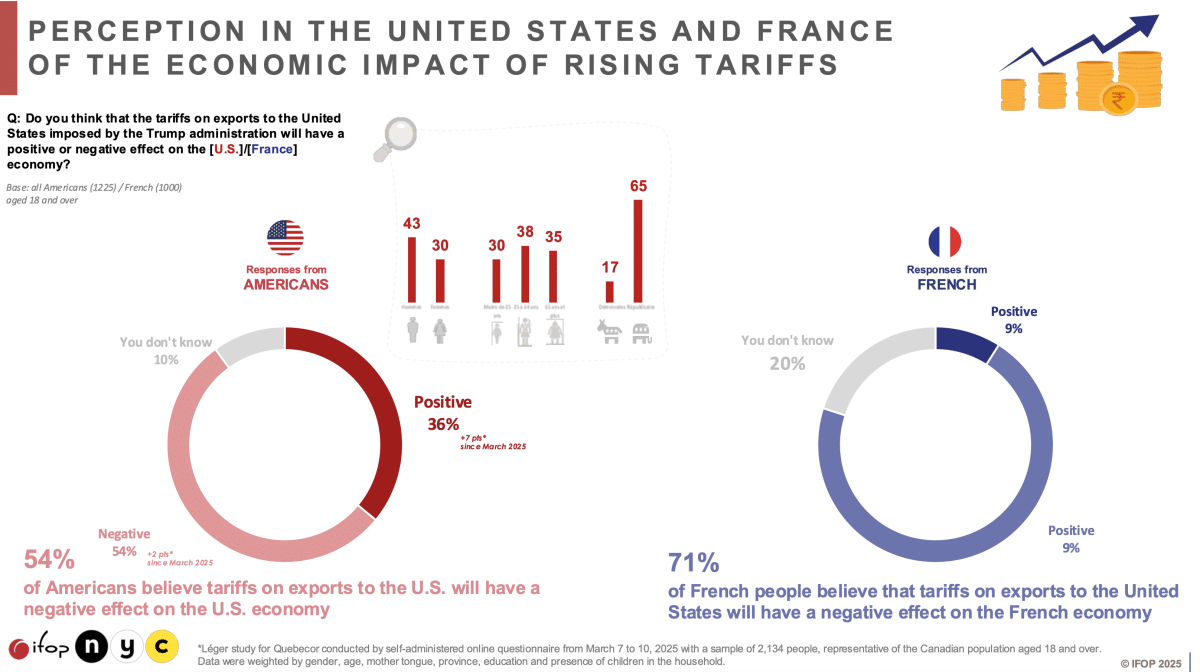
[1] Léger study for Québecor conducted by self-administered online questionnaire from March 7 to 10, 2025, with a sample of 2,134 people, representative of the Canadian population aged 18 and over. Data were weighted according to gender, age, mother tongue, province, level of education and presence of children in the household.
2 – Fear of trade retaliation dominates US concerns
A strong majority of Americans (71%) say they are worried that countries affected by the tax hikes will impose similar tariffs on American products in return. This concern partly transcends political divides, but peaks among Kamala Harris voters (87%) and Democrats (88%).
This concern is particularly pronounced among higher education graduates (82% for those with postgraduate degree holders), senior executives (80%) and high-income households (75% for incomes over $100,000), i.e. categories that are generally more aware of the importance of export markets for the US economy.
3 – The shadow of boycott looms over American products
Apprehension about possible boycotts of American products is also significant: 64% of Americans fear that the tax hikes will spark boycotts abroad. This concern is particularly marked among Democrats (79%) and non-patriots (66%), who tend to be more sensitive to the U.S. international image.
This high level of concern is explained in particular by the growing media coverage of anti-American boycott movements that have emerged in several countries since the tariff hike, as seen with the #BoycottUSA movement in France.
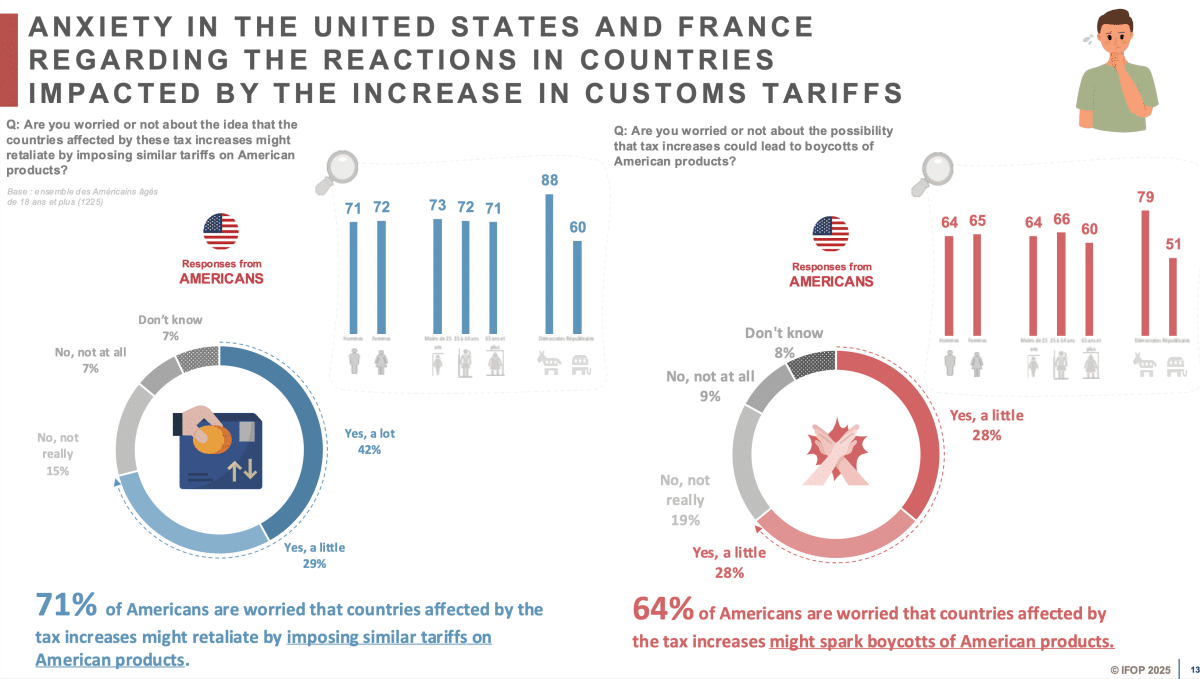
Americans appear well aware about the fact that their dominant position in world trade does not necessarily protect them from the effects of a trade war.
HIGHER TARIFFS AROUSE MASSIVE DISAPPROVAL IN FRANCE, BUT DIVIDE AMERICAN OPINION…
The second major finding of this study is the striking contrast between the French reaction, which is overwhelmingly hostile to protectionist measures, and the much more nuanced American position, reflecting the deep divisions in American society.
4 – A transatlantic gap in tariff approval
There is a spectacular gap between the two countries when it comes to approval of these measures: 72% of the French disapprove of higher tariffs on goods entering the United States, compared with just 49% of Americans, revealing a 23-point gap. Conversely, only 18% of the French approve of these measures, three times less than the Americans (45%).
This difference is partly explained by the direct economic stakes for both countries: France, as an economy more dependent on exports, is potentially more vulnerable to American protectionist measures. Moreover, the absence of partisan political stakes for the French facilitates a more unanimous rejection.
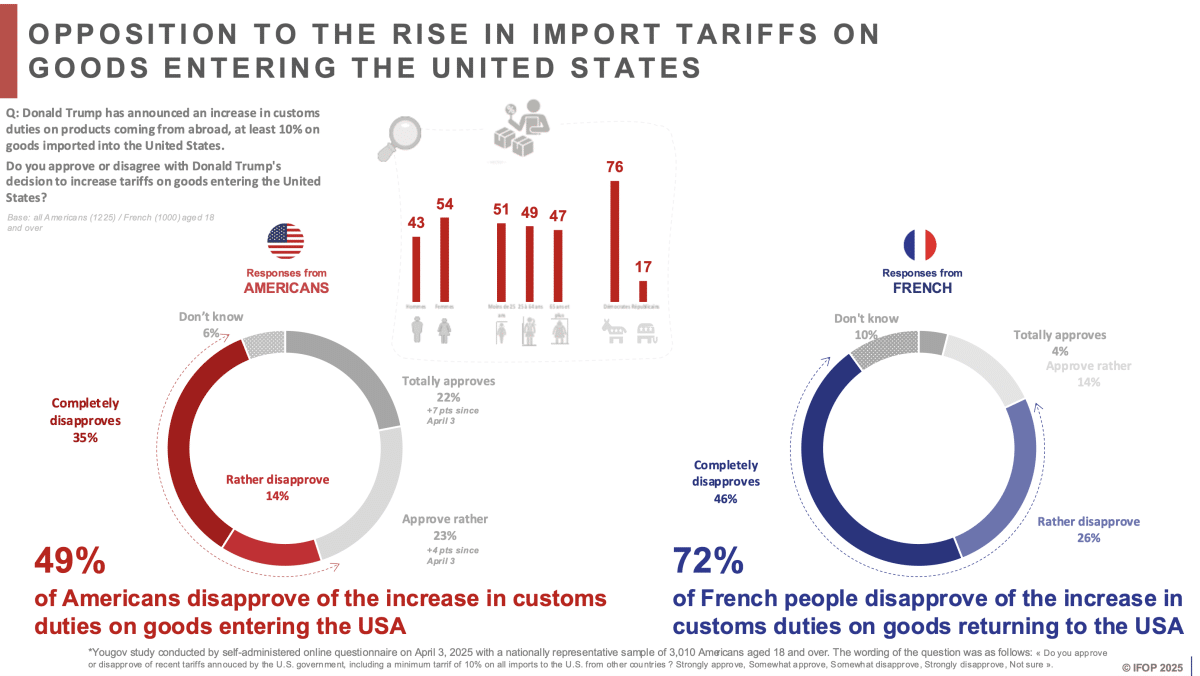
5 – America deeply divided over tariffs
In the United States, public opinion reflects the extreme polarization of society: opposition to this tariffs policy follows a particularly clear partisan divide, with 76% of Democrats disapproving of these measures, compared to just 17% of Republicans. This divide is reflected in the 2024 presidential vote: 81% of Kamala Harris voters oppose these measures, compared with just 15% of Donald Trump voters.
The analysis also reveals a pronounced ideological divide: 63% of “very progressive” and 75% of “fairly progressive” respondents disapprove of tariff hikes, compared with just 20% of “fairly conservative” and 9% of “very conservative” respondents.
Resistance to the tariffs is particularly marked among American women (54%, versus 43% among men), revealing a significant gender gap that is mirrored in many other political issues. Similarly, minority populations are more hostile to these measures: 63% of blacks, 58% of Asians and 72% of people of mixed race or other races disapprove of them, compared with 44% of whites. This disparity partly reflects the political alignments of these different communities, but probably also their sensitivity to issues of economic justice and inequality.
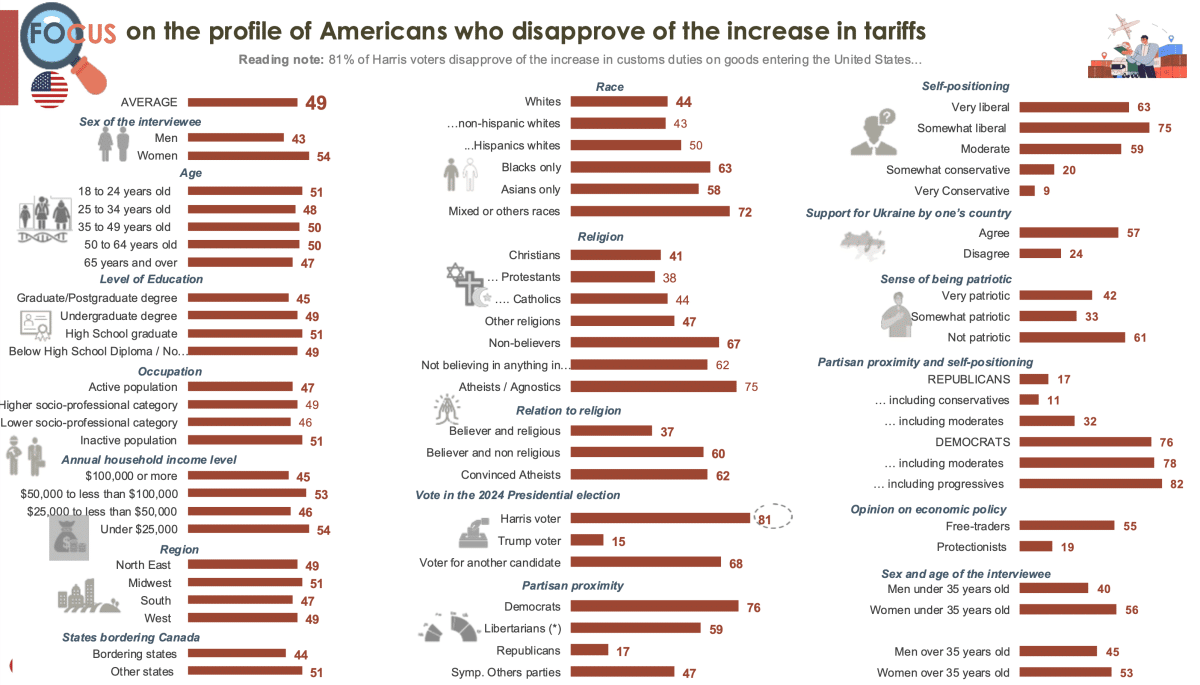
6 – Slightly different levels of disapproval of tariffs in different countries
Suspended for 90 days since April 9, the protectionist measures specifically affecting certain countries are also being contested, but not overwhelmingly: half of Americans disapprove of the 20% tariff hike on European products (50%, versus 37% who approve). But they are less critical of the 145% tariff increase on Chinese products (49%, versus 40% who approve).
THE AMERICAN PARADOX: GROWING SUPPORT FOR FREE TRADE DESPITE PROTECTIONIST POLICIES…
The third major finding of this study is the paradox between the long-term evolution of opinions on free trade and reactions to current tariff policies.
7 – A historic reversal: Americans now more in favor of free trade than the French
The evolution of opinions since 1993 reveals a profound change in people’s view of international trade: while only 44% of Americans favored free trade thirty years ago, 69% are now in favor, an increase of 25 points. Conversely, the French have undergone the opposite evolution: whereas 61% of them supported free trade in 1993, only 47% do so today (-14 points), in favor of protectionism, which is now supported by 41% (versus 34% in 1993).
This reversal reflects a striking paradox: it is precisely at a time when the US administration is implementing protectionist policies that American citizens seem most convinced of the virtues of free trade. This paradox can be explained in part by a pragmatic vision of international trade: for many Americans, protectionist measures can be seen as tactical tools that do not call into question the general adherence to the principle of free trade.
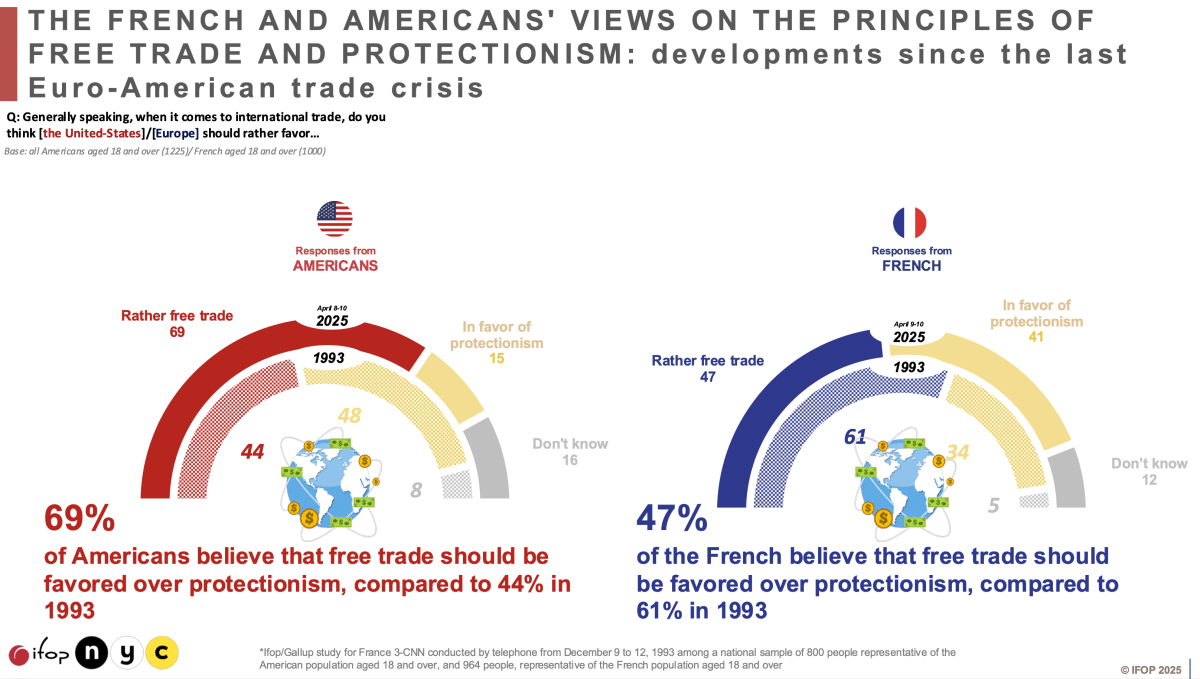
8 – Support for free trade transcends political divides in the United States
This support for free trade principles transcends traditional political divides in the USA: 77% of Democrats and 66% of Republicans are in favor. This relative convergence contrasts with the French situation, where positions are much more politically marked: 76% of right-wing voters are in favor of free trade, compared with just 49% of left-wing voters.
An analysis of socio-demographic profiles reveals that support for free trade in the USA is particularly strong among university graduates (75%), senior executives (74%) and high-income households (76% for incomes over $100,000). These categories, who have generally benefited the most from globalization, remain the most attached to free trade despite the sometimes perceived negative effects on industrial employment.
9 – A concern for purchasing power that affects all categories of the population
Despite these divisions, a common concern emerges about the impact of tariffs on purchasing power: 51% of Americans and 48% of French believe that raising tariffs is “rather a bad thing”, as it will make products more expensive and reduce consumers’ purchasing power.
This concern is particularly marked among the American middle classes: 53% of households earning between $50,000 and $100,000 a year disapprove of these measures, as do 54% of the most modest households (under $25,000). These categories are more sensitive to changes in consumer prices, and fear that the rate hikes will lead to inflation.
10 – The complexity of public opinion on international trade issuesFinally, this study highlights the complexity of public attitudes to trade issues. For a significant proportion of Americans, adherence to the general principles of free trade is not incompatible with support for targeted protectionist measures in certain sectors or against certain countries.
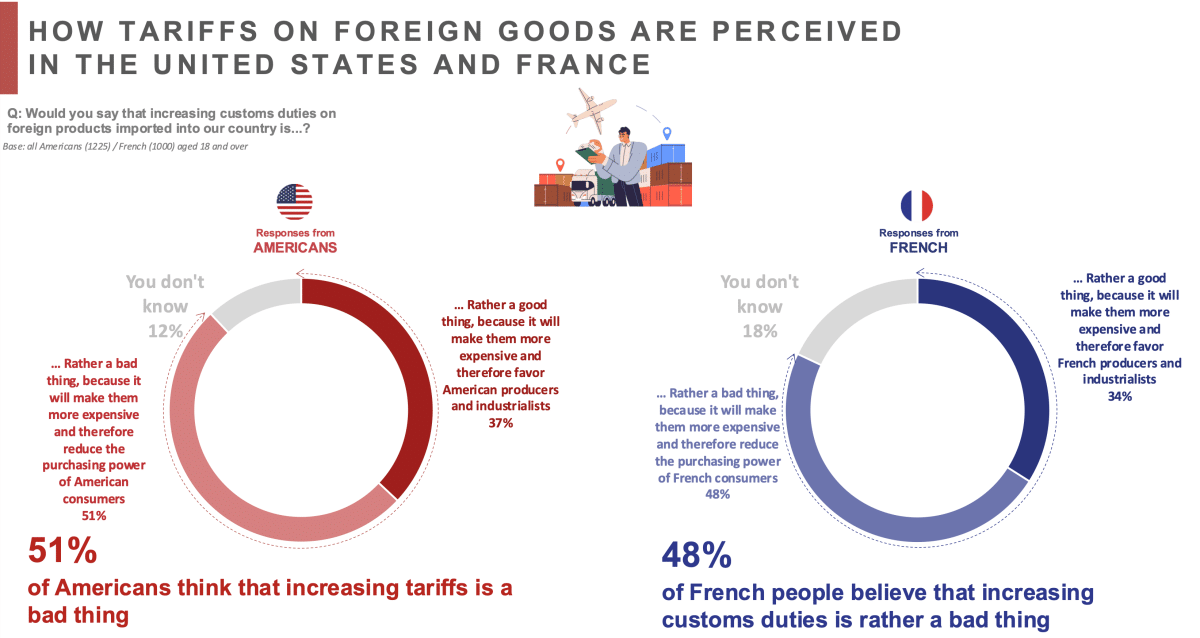
This apparent paradox can be explained by several factors: a pragmatic vision of international trade, a distinction between general principles and specific applications, but also a shift in concerns towards a logic of “fair trade” rather than absolute “free trade”. For many Americans, higher tariffs can be seen as a rebalancing of trade relations, rather than a challenge to the global trading system.
The viewpoint of François Kraus of Ifop, Director of the Politics & News Department
This study reveals real concern about the economic effects of the Trump administration’s tariff hikes, both in the USA and in France, but also reveals a landscape of opinion riddled with paradoxes. While these protectionist measures raise legitimate fears about inflation and the risk of trade retaliation, they come against a backdrop in which Americans have, paradoxically, developed a growing attachment to the principles of free trade. Conversely, the French are increasingly attracted to protectionism. This dissonance is largely explained by national political systems: in the USA, support for free trade has become bipartisan, carried by elites from both camps, while in France, it is more supported by the privileged categories and contested by the working classes. This discrepancy between policies implemented and public preferences illustrates the complexity of the debate on globalization in the 21st century, where the binary opposition between free trade and protectionism is gradually giving way to a search for more nuanced regulation of international trade….
TO QUOTE THIS STUDY, USE AT LEAST THE FOLLOWING FORMULATION:
“Ifop study for NYC.eu carried out by online self-administered questionnaire among a nationally representative sample of 1,225 Americans aged 18 and over (April 8-10, 2025), and a nationally representative sample of 1,000 French people aged 18 and over (April 9-10, 2025). For comparison purposes, a probability sample of this size would have a margin of error of at most ±3% (19 times out of 20)”.
